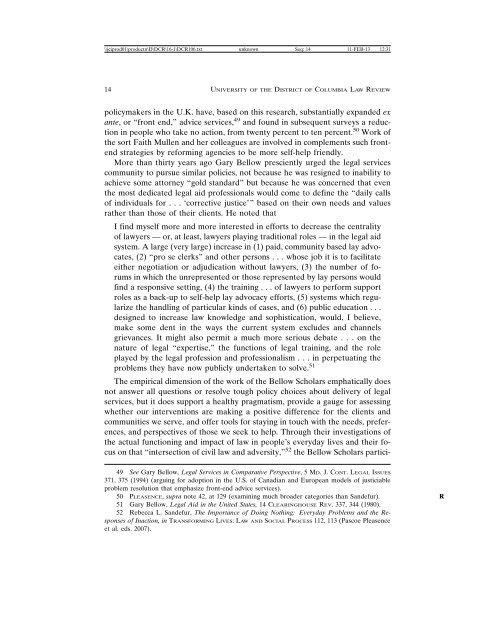volume 16, number 1 - UDC Law Review
volume 16, number 1 - UDC Law Review
volume 16, number 1 - UDC Law Review
- No tags were found...
You also want an ePaper? Increase the reach of your titles
YUMPU automatically turns print PDFs into web optimized ePapers that Google loves.
\\jciprod01\productn\D\DCR\<strong>16</strong>-1\DCR106.txt unknown Seq: 14 11-FEB-13 12:3114 UNIVERSITY OF THE DISTRICT OF COLUMBIA LAW REVIEWpolicymakers in the U.K. have, based on this research, substantially expanded exante, or “front end,” advice services, 49 and found in subsequent surveys a reductionin people who take no action, from twenty percent to ten percent. 50 Work ofthe sort Faith Mullen and her colleagues are involved in complements such frontendstrategies by reforming agencies to be more self-help friendly.More than thirty years ago Gary Bellow presciently urged the legal servicescommunity to pursue similar policies, not because he was resigned to inability toachieve some attorney “gold standard” but because he was concerned that eventhe most dedicated legal aid professionals would come to define the “daily callsof individuals for . . . ‘corrective justice’” based on their own needs and valuesrather than those of their clients. He noted thatI find myself more and more interested in efforts to decrease the centralityof lawyers — or, at least, lawyers playing traditional roles — in the legal aidsystem. A large (very large) increase in (1) paid, community based lay advocates,(2) “pro se clerks” and other persons . . . whose job it is to facilitateeither negotiation or adjudication without lawyers, (3) the <strong>number</strong> of forumsin which the unrepresented or those represented by lay persons wouldfind a responsive setting, (4) the training . . . of lawyers to perform supportroles as a back-up to self-help lay advocacy efforts, (5) systems which regularizethe handling of particular kinds of cases, and (6) public education . . .designed to increase law knowledge and sophistication, would, I believe,make some dent in the ways the current system excludes and channelsgrievances. It might also permit a much more serious debate . . . on thenature of legal “expertise,” the functions of legal training, and the roleplayed by the legal profession and professionalism . . . in perpetuating theproblems they have now publicly undertaken to solve. 51The empirical dimension of the work of the Bellow Scholars emphatically doesnot answer all questions or resolve tough policy choices about delivery of legalservices, but it does support a healthy pragmatism, provide a gauge for assessingwhether our interventions are making a positive difference for the clients andcommunities we serve, and offer tools for staying in touch with the needs, preferences,and perspectives of those we seek to help. Through their investigations ofthe actual functioning and impact of law in people’s everyday lives and their focuson that “intersection of civil law and adversity,” 52 the Bellow Scholars partici-49 See Gary Bellow, Legal Services in Comparative Perspective, 5 MD. J. CONT. LEGAL ISSUES371, 375 (1994) (arguing for adoption in the U.S. of Canadian and European models of justiciableproblem resolution that emphasize front-end advice services).50 PLEASENCE, supra note 42, at 129 (examining much broader categories than Sandefur). R51 Gary Bellow, Legal Aid in the United States, 14 CLEARINGHOUSE REV. 337, 344 (1980).52 Rebecca L. Sandefur, The Importance of Doing Nothing: Everyday Problems and the Responsesof Inaction, in TRANSFORMING LIVES: LAW AND SOCIAL PROCESS 112, 113 (Pascoe Pleasenceet al. eds. 2007).














